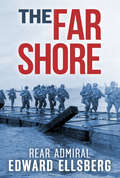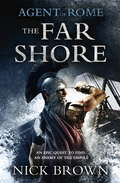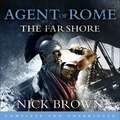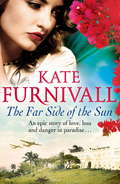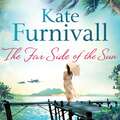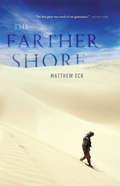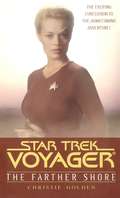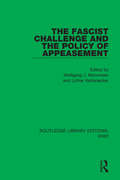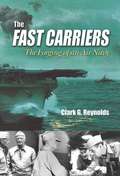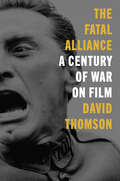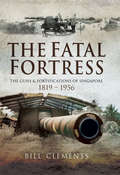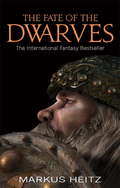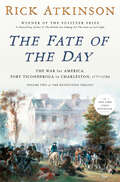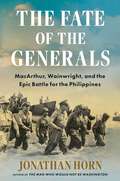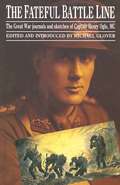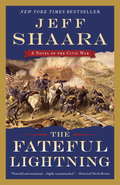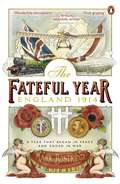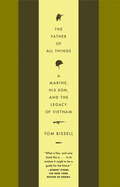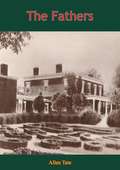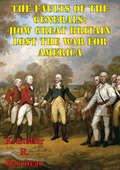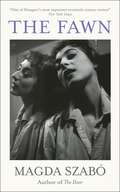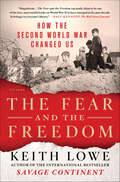- Table View
- List View
The Far Shore
by Rear-Admiral Edward EllsbergThe Far Shore, first published in 1960, is a classic account of the Allied D-Day landings in France in June 1944 by U.S. Navy Admiral and popular author Edward Ellsberg (1891-1983). Described in detail are the massive preparations for the invasion, the Nazi defenses along the Normandy beaches, and the ingenious creation of the Mulberry artificial floating harbor which would prove vital in securing the Allied beachhead in France. Illustrated throughout with clear drawings of the types of landing craft used, the beach barriers facing the ships and troops, the Mulberry harbor units, and several maps.
The Far Shore: Agent of Rome 3
by Nick BrownWhen the deputy commander of Rome's Imperial Security Service is assassinated on the island of Rhodes, Cassius Corbulo swiftly finds himself embroiled in the investigation. Assisted once more by ex-gladiator bodyguard Indavara and servant Simo, his search for the truth is complicated by the involvement of the dead man's headstrong daughter, Annia. Braving hostile seas, Cassius and his allies follow the assassin's trail south aboard a ship captained by a roguish Carthaginian smuggler and manned by his disparate, dangerous crew. Their journey leads them to the farthest reaches of the empire; to a ruined city where the rules of Roman civilization have long been abandoned, and a deadly battle of wits with a brutal, relentless foe.
The Far Shore: Agent of Rome 3
by Nick BrownWhen the deputy commander of Rome's Imperial Security Service is assassinated on the island of Rhodes, Cassius Corbulo swiftly finds himself embroiled in the investigation. Assisted once more by ex-gladiator bodyguard Indavara and servant Simo, his search for the truth is complicated by the involvement of the dead man's headstrong daughter, Annia. Braving hostile seas, Cassius and his allies follow the assassin's trail south aboard a ship captained by a roguish Carthaginian smuggler and manned by his disparate, dangerous crew. Their journey leads them to the farthest reaches of the empire; to a ruined city where the rules of Roman civilization have long been abandoned, and a deadly battle of wits with a brutal, relentless foe.
The Far Shore: Agent of Rome 3 (Agent of Rome #3)
by Nick BrownWhen the deputy commander of Rome's Imperial Security Service is assassinated on the island of Rhodes, Cassius Corbulo swiftly finds himself embroiled in the investigation. Assisted once more by ex-gladiator bodyguard Indavara and servant Simo, his search for the truth is complicated by the involvement of the dead man's headstrong daughter, Annia. Braving hostile seas, Cassius and his allies follow the assassin's trail south aboard a ship captained by a roguish Carthaginian smuggler and manned by his disparate, dangerous crew. Their journey leads them to the farthest reaches of the empire; to a ruined city where the rules of Roman civilization have long been abandoned, and a deadly battle of wits with a brutal, relentless foe.(P)2013 Hodder & Stoughton
The Far Side of the Sun: An epic story of love, loss and danger in paradise . . .
by Kate Furnivall*** THE Sunday Times TOP TEN BESTSELLING AUTHOR *** 'Wonderful . . . hugely ambitious and atmospheric' Kate Mosse Discover a brilliant story of love, danger, courage and betrayal, from the internationally bestselling author of The Betrayal. ***** With beautiful blue skies, sandy beaches and glorious sunshine, the Bahamas is a slice of heaven. But in 1943, the world is at war and even paradise isn't safe . . . Twenty-three-year-old Dodie Wyatt thought she had escaped her turbulent past - but one night her peace is shattered when she chooses to help a man she finds stabbed in an alleyway. On the other side of Nassau, wealthy diplomat's wife Ella Stanford plays the role she has been born into, throwing herself into charitable work and charming her husband's powerful friends. But she has secrets to keep - and those secrets could put her life in danger. Further praise for Kate Furnivall: 'Superb storytelling' Dinah Jefferies 'A thrilling plot ... Fast-paced with a sinister edge' Times 'A thrilling, compelling read. Wonderful!' Lesley Pearse 'Gripping . . . poignant, beautifully written ...will capture the reader to the last' Sun 'Truly captivating' Elle 'Perfect escapist reading' Marie Claire 'An achingly beautiful epic' New Woman 'A rollicking good read' Daily Telegraph
The Far Side of the Sun: An epic story of love, loss and danger in paradise . . .
by Kate Furnivall*** THE Sunday Times TOP TEN BESTSELLING AUTHOR *** 'Wonderful . . . hugely ambitious and atmospheric' Kate Mosse Discover a brilliant story of love, danger, courage and betrayal, from the internationally bestselling author of The Betrayal. ***** With beautiful blue skies, sandy beaches and glorious sunshine, the Bahamas is a slice of heaven. But in 1943, the world is at war and even paradise isn't safe . . . Twenty-three-year-old Dodie Wyatt thought she had escaped her turbulent past - but one night her peace is shattered when she chooses to help a man she finds stabbed in an alleyway. On the other side of Nassau, wealthy diplomat's wife Ella Stanford plays the role she has been born into, throwing herself into charitable work and charming her husband's powerful friends. But she has secrets to keep - and those secrets could put her life in danger. Further praise for Kate Furnivall: 'Superb storytelling' Dinah Jefferies 'A thrilling plot ... Fast-paced with a sinister edge' Times 'A thrilling, compelling read. Wonderful!' Lesley Pearse 'Gripping . . . poignant, beautifully written ...will capture the reader to the last' Sun 'Truly captivating' Elle 'Perfect escapist reading' Marie Claire 'An achingly beautiful epic' New Woman 'A rollicking good read' Daily Telegraph
The Farther Shore
by Matthew Eck“Short, sharp, devastating, The Farther Shore is a literary machine gun . . . a winning debut that happens to be a war novel.” —Kansas City StarA small unit of soldiers from the US Army is separated from their command and left for dead. Their only option is to keep moving, in hope that they’ll escape the marauding gangs and clansmen who appear to rule the city. Josh, a young soldier, and his “battle buddies” are left to wander in this hostile territory. A series of nightmarish, often violent encounters leaves only a few of them alive. The Farther Shore is a short, stark war novel in which the characters are both haunting and inhuman, natives and invaders alike. The emerging story reflects a new kind of military engagement, with all the attendant horrors and difficulties of fighting in a strange new postmodern battlefield. In his unforgettable debut novel, Matthew Eck puts readers inside the mind of a confused young soldier caught in the fog of unexpected warfare.“Bold, profane, hallucinatory.” —Seattle Post-Intelligencer“Haunting . . . goes beyond the on-the-ground chaos of battle to capture the physical and psychological disorientation of modern war.” —Publishers Weekly“Every word in Eck’s first novel is as solid as a stone. Every moment of crisis feels authentic in its terror and tragedy; indeed, Eck served as a soldier in Somalia at age eighteen. Heir to Hemingway, and damn near as powerful as Cormac McCarthy in The Road, Eck has created a contemporary version of The Red Badge of Courage in this tale of one young man’s trial by fire in the pandemonium of war in an age of high-tech weaponry and low-grade morality.” —Booklist (starred review)“The first great war novel of our generation.” —Salon
The Farther Shore: Farther Shore (Star Trek: Voyager #2)
by Christie GoldenThe Earth is in the crosshairs of an unrelenting Borg plague in this white-knuckled Star Trek thriller featuring Admiral Janeway and her crew.When an unstoppable Borg plague breaks out upon Earth, blame quickly falls on the newly returned crew of the U.S.S. Voyager. Did Kathryn Janeway and the others unknowingly carry this insidious infection back with them? Many in Starfleet think so, and Seven of Nine, in particular, falls under a cloud of suspicion. Now, with a little help from the U.S.S. Enterprise, Admiral Janeway must reunite her crew in a desperate, last-ditch attempt to discover the true source of the contagion and save Earth itself from total assimilation into a voracious new Borg Collective. But time is running out. Has Voyager come home only to witness humanity&’s end?
The Fascist Challenge and the Policy of Appeasement (Routledge Library Editions: WW2 #8)
by Wolfgang J. Mommsen and Lothar KettenackerThis book, first published in 1983, illustrates the domestic and internal dimension of appeasement and explores the political options open to the western powers in the run up to the Second World War. It looks at the factors pointing in the direction of a general settlement with the dictators: limitation of resources and strategic over-commitment by Britain; economic decline and financial exhaustion of France; lack of support from the United States and the Soviet Union.
The Fast Carriers
by Clark ReynoldsThis classic study is considered essential reading for its analysis of fast aircraft carrier development in WWII. It provides a fascinating record not only of the U.S. Navy's metamorphosis from a battleship-oriented to a carrier-centered fleet, but also of the heated debates that took place over the changing naval strategy. With an insider's grasp of the famous individuals involved, award-winning naval historian Clark G. Reynolds takes readers from the war rooms of Washington to the flight decks of the Pacific. He vividly describes the battles over the concept of fast carriers between the air admirals and battleship admirals and offers little-known details gleaned from personal interviews and private diaries.
The Fatal Alliance: A Century of War on Film
by David Thomson“A marvelous bombshell of a book, by one of our most formidably knowledgeable and insightful writers on film, it is filled with surprises and witty asides. Though Thomson is quick to pounce on the hypocrisies and historical omissions of some of these war movies, there is nothing compromised about his own daredevil judgments. We are in the hands of a master critic/essayist.”—Phillip LopateFrom one of the greatest living writers on film, a magisterial look at a century of battle depicted on screen, and a meditation on the twisted relationship between war and the movies.In The Fatal Alliance the acclaimed film critic David Thomson offers us one of his most provocative books yet—a rich, arresting, and troubling study of that most beloved genre: the war movie. It is not a standard history or survey of war films, although Thomson turns his typically piercing eye to many favorites—from All Quiet on the Western Front to The Bridge on the River Kwai to Saving Private Ryan. But The Fatal Alliance does much more, exploring how war and cinema in the twentieth century became inextricably linked. Movies had only begun to exist by the beginning of World War I, yet in less than a century, had transformed civilian experience of war—and history itself—for millions around the globe. This reality is the moral conundrum at the heart of Thomson’s book. War movies bring both prestige and are so often box office blockbusters; but is there something problematic at how much moviegoers enjoy depictions of violence on a grand scale, such as Apocalypse Now, Black Hawk Down, or even Star Wars? And what does this truth say about us, our culture, and our changing sense of warfare and the past?
The Fatal Fortress: The Guns and Fortifications of Singapore 1819–1953
by Bill ClementsThe military historian presents a fascinating reassessment of Britain&’s Singapore Naval Base and the WWII Battle of Singapore. The Fall of Singapore in February 1942 was arguably the greatest disaster suffered by the British Empire. Between 1923 and 1938, the Singapore naval base had been upgraded with some of the largest coast guns ever installed. But the guns&’ design and incorrect siting have since been blamed for the humiliating loss during World War II. In The Fatal Fortress, Bill Clements traces the history of Singapore&’s armaments from the city&’s founding in 1819 to the demise of coast artillery in the British Army in 1953. He also follows the development of artillery through the Victorian era of muzzleloading guns to the introduction of breechloading guns in the twentieth century. Clements argues that it was not the siting of the guns that brought about the fall of Singapore, but an overall failure in command and control and a lack of suitable ammunition. This volume is illustrated throughout with photographs, drawings and plans, and contains a gazetteer describing all the batteries and forts, both existing and demolished. There is also an annex giving the details of the guns that were installed in Singapore.
The Fate Of The Dwarves: Book 4 (Dwarves #4)
by Markus HeitzFor the last time, the dwarves are going to war - and the outcome will decide the fate of their race. There has been no word from the brave warrior Tungdil since the vicious battle at the Black Abyss. Dragons, magicians, and the malevolent älfar have advanced far into the kingdom of Girdlegard, ruthlessly seizing vast areas of land. The dwarves seem to be facing their next battle with little hope of survival. But then the inexplicable happens. A dwarf dressed in black armour returns from the abyss with a formidable army in tow. He calls himself Tungdil, and for his most loyal friend Ireheart and his allies, this means a new hope. But soon doubts begin to arise . . . Could this really be Tungdil, or is this warrior following his own dark agenda? It is a question of the future of Girdlegard - and the future of all the dwarves.The concluding novel in the international bestselling Dwarves series.Other books by Markus Heitz:The DwarvesThe War of the DwarvesThe Revenge of the DwarvesThe Triumph of the DwarvesRighteous FuryDevastating HateDark PathsRaging StormAera book's one to ten
The Fate Of The Earth
by Jonathan SchellDefining the shape and the dimensions of the nuclear predicament.
The Fate of the Day: The War for America, Fort Ticonderoga to Charleston, 1777-1780
by Rick Atkinson#1 NEW YORK TIMES BESTSELLER • In the second volume of the landmark American Revolution trilogy by the bestselling author of The British Are Coming, George Washington&’s army fights on the knife edge between victory and defeat.&“This is great history . . . compulsively readable . . . There is no better writer of narrative history than the Pulitzer Prize–winning Atkinson.&”—The New York Times (Editors&’ Choice)The first twenty-one months of the American Revolution—which began at Lexington and ended at Princeton—was the story of a ragged group of militiamen and soldiers fighting to forge a new nation. By the winter of 1777, the exhausted Continental Army could claim only that it had barely escaped annihilation by the world&’s most formidable fighting force.Two years into the war, George III is as determined as ever to bring his rebellious colonies to heel. But the king&’s task is now far more complicated: fighting a determined enemy on the other side of the Atlantic has become ruinously expensive, and spies tell him that the French and Spanish are threatening to join forces with the Americans.Prize-winning historian Rick Atkinson provides a riveting narrative covering the middle years of the Revolution. Stationed in Paris, Benjamin Franklin woos the French; in Pennsylvania, George Washington pleads with Congress to deliver the money, men, and materiel he needs to continue the fight. In New York, General William Howe, the commander of the greatest army the British have ever sent overseas, plans a new campaign against the Americans—even as he is no longer certain that he can win this searing, bloody war. The months and years that follow bring epic battles at Brandywine, Saratoga, Monmouth, and Charleston, a winter of misery at Valley Forge, and yet more appeals for sacrifice by every American committed to the struggle for freedom.Timed to coincide with the 250th anniversary of the beginning of the Revolution, Atkinson&’s brilliant account of the lethal conflict between the Americans and the British offers not only deeply researched and spectacularly dramatic history, but also a new perspective on the demands that a democracy makes on its citizens.
The Fate of the Generals: MacArthur, Wainwright, and the Epic Battle for the Philippines
by Jonathan HornIn the tradition of Hampton Sides&’s bestseller Ghost Soldiers comes a World War II story of bravery, survival, and sacrifice—the vow Douglas MacArthur made to return to the Philippines and the oath his fellow general Jonathan Mayhew Wainwright made to stay with his men there whatever the cost.For the doomed stand American forces made in the Philippines at the start of World War II, two generals received their country&’s highest military award, the Medal of Honor. One was the charismatic and controversial Douglas MacArthur, whose orders forced him to leave his soldiers on the islands to starvation and surrender but whose vow to return echoed around the globe. The other was the gritty Jonathan Mayhew Wainwright, who became a hero to the troops whose fate he insisted on sharing even when it meant becoming the highest-ranking American prisoner of the Japanese. In The Fate of the Generals, bestselling author Jonathan Horn brings together the story of two men who received the same medal but found honor on very different paths. MacArthur&’s journey would require a daring escape with his wife and young child to Australia and then years of fighting over the thousands of miles needed to make it back to the Philippines, where he would fulfill his famous vow only to see the city he called home burn. Wainwright&’s journey would take him from the Philippines to Taiwan and Manchuria as his captors tortured him in prisons and left him to wonder whether his countrymen would ever understand the choice he had made to surrender for the sake of his men. A story of war made personal based on meticulous research into diaries and letters including boxes of previously unexplored papers, The Fate of the Generals is a vivid account that raises timely questions about how we define honor and how we choose our heroes, and is destined to become a classic of World War II history.
The Fateful Alliance: France, Russia, and the Coming of the First World War
by George F. KennanA compelling book about the true cause of the First World War as told by Kennan in this concise and well-researched historical book.
The Fateful Battle Line: The Great War Journals and Sketches of Captain Henry Ogle, MC
by Michael GloverThe diaries of front-line soldiers of the Great War are relatively commonplace; contemporary drawings and paintings, other than those by the official war artists, are less so. What is extraordinary, even unique, about The Fateful Battle Line is that it combines a journal of infantry service on the Western Front with sketches and finished work made at the time, often illustrating places, people and incident from the text. Henry Ogle was a trained artist, and one who, in his writing, fused the vividness of the painter's eye for detail with a writer's precision and awareness. Commissioned from the ranks, twice wounded, his gallantry rewarded with the Military Cross, he endured four years of war; if the experience seared him, it never took from him his humanity. Front-line, support and reserve trenches; raids, patrols and work details; outposts and piquets; hospitals and base areas; French and Belgian towns and villages; leave back home in England ; the tragic landscape of Flanders; weapons, artillery, transport, draft and riding animals; above all his fellow soldiers - Henry Ogle faithfully, and often wittily, recorded the day-to-day minutiae, as well as the sudden shattering moments, of vast industrial armies locked in the last of the great siege wars. In doing so, and in his accompanying text, he demonstrated that the enduring legacy of the Great War lay in the spirit of the men who fought it. Skillfully edited and annotated by the late Michael Glover, The Fateful Battle Line is perhaps the most remarkable and enduring original work to have come out of the First World War in the last fifty years.
The Fateful Lightning
by Jeff ShaaraFrom New York Times bestselling author Jeff Shaara comes the riveting final installment in the Civil War series that began with A Blaze of Glory and continued in A Chain of Thunder and The Smoke at Dawn. November 1864: As the Civil War rolls into its fourth bloody year, the tide has turned decidedly in favor of the Union. A grateful Abraham Lincoln responds to Ulysses S. Grant's successes by bringing the general east, promoting Grant to command the entire Union war effort, while William Tecumseh Sherman now directs the Federal forces that occupy all of Tennessee. In a massive surge southward, Sherman conquers the city of Atlanta, sweeping aside the Confederate army under the inept leadership of General John Bell Hood. Pushing through northern Georgia, Sherman's legendary "March to the Sea" shoves away any Rebel presence, and by Christmas 1864 the city of Savannah falls into the hands of "Uncle Billy." Now there is but one direction for Sherman to go. In his way stands the last great hope for the Southern cause, General Joseph E. Johnston. In the concluding novel of his epic Civil War tetralogy, Jeff Shaara tells the dramatic story of the final eight months of battle from multiple perspectives: the commanders in their tents making plans for total victory, as well as the ordinary foot soldiers and cavalrymen who carried out their orders until the last alarum sounded. Through Sherman's eyes, we gain insight into the mind of the general who vowed to "make Georgia howl" until it surrendered. In Johnston, we see a man agonizing over the limits of his army's power, and accepting the burden of leading the last desperate effort to ensure the survival of the Confederacy. The Civil War did not end quietly. It climaxed in a storm of fury that lay waste to everything in its path. The Fateful Lightning brings to life those final brutal, bloody months of fighting with you-are-there immediacy, grounded in the meticulous research that readers have come to expect from Jeff Shaara. Praise for Jeff Shaara's new Civil War series The Fateful Lightning "Outstanding . . . Shaara combines his extensive knowledge of military history with his consummate skill as a storyteller to vivify [Sherman's March to the Sea]. . . . The Union and Confederate strategies, tactics, and points of view are both represented, providing a measure of balance and clarity to a campaign that is often viewed through a lopsided lens. By concentrating on the western theater throughout this series, Shaara has opened a welcome literary window to some of the less familiar Civil War battles and campaigns."--Booklist A Blaze of Glory "[An] exciting read . . . This novel is meticulously researched and brings a vivid reality to the historical events depicted."--Library Journal "Dynamic portrayals [of] Johnston, Grant and William Tecumseh Sherman."--The Wall Street Journal A Chain of Thunder "Shaara continues to draw powerful novels from the bloody history of the Civil War."--Kirkus Reviews "Shaara's historical accuracy is faultless. . . . The voices of these people come across to the reader as poignantly clear as they did 150 years ago."--Historical Novels Review The Smoke at Dawn "Beautifully written . . . Shaara once again elevates history from mere rote fact to explosive and engaging drama."--BookreporterFrom the Hardcover edition.
The Fateful Year: England 1914
by Mark BostridgeThe Fateful Year by Mark Bostridge is the story of England in 1914. War with Germany, so often imagined and predicted, finally broke out when people were least prepared for it. Here, among a crowded cast of unforgettable characters, are suffragettes, armed with axes, destroying works of art, schoolchildren going on strike in support of their teachers, and celebrity aviators thrilling spectators by looping the loop. A theatrical diva prepares to shock her audience, while an English poet in the making sets out on a midsummer railway journey that will result in the creation of a poem that remains loved and widely known to this day. With the coming of war, England is beset by rumour and foreboding. There is hysteria about German spies, fears of invasion, while patriotic women hand out white feathers to men who have failed to rush to their country's defence. In the book's final pages, a bomb falls from the air onto British soil for the first time, and people live in expectation of air raids. As 1914 fades out, England is preparing itself for the prospect of a war of long duration.Mark Bostridge won the Gladstone Memorial Prize at Oxford University. His first book Vera Brittain: A Life was shortlisted for the Whitbread Biography Prize, the NCR NonFiction Award, and the Fawcett Prize. His books also include the bestselling Letters from a Lost Generation; Lives for Sale, a collection of biographers' tales; Because You Died, a selection of Vera Brittain's First World War poetry and prose; and Florence Nightingale: The Woman and her Legend, which was named as a Wall Street Journal Best Book of 2008 and awarded the Elizabeth Longford Prize for Historical Biography. The Fateful Year was shortlisted for the PEN Hessell-Tiltman Prize for History 2015.
The Father of All Things
by Tom BissellThe Father of All Things is a riveting, haunting, and often hilarious account of a veteran and his son's journey through Vietnam. As his father recounts his experiences as a soldier, including a near fatal injury, Tom Bissell weaves a larger history of the war and explores the controversies that still spark furious debate today. Blending history, memoir, and travelogue,The Father of All Things is a portrait of the war's personal, political, and cultural impact from the perspective of the generation that grew up in the wake of the conflict. It is also a wise and revelatory book about the bond between fathers and sons.
The Fathers
by Allen TateThe Fathers is the powerful novel by the poet and critic recognized as one of the great men of letters of our time, Alan Tate.Old Major Buchan of Pleasant Hill, Fairfax County, Virginia, lived by a gentlemen's agreement to ignore what was base or rude, to live a life which was gentle and comfortable because it was formal. Into this life George Posey came dashing, as Henry Steele Commager observed, "to defy Major Buchan, marry Susan, betray Charles and Semmes, dazzle young Lacy, challenge and destroy the old order of things.""Great novel of the broken South."--George Steiner in The New Yorker"A psychological horror story...concerned with life rather than death, with significance rather than with futility."--Henry Steele Commager"The story displays so much imagination and such a profound reflection upon life that it cannot be neglected by anyone interested in contemporary literature."--Edwin Muir"A masterpiece of formal beauty...deserves to be recognized as one of the most outstanding novels of our time."--Janet Adam-Smith in The New Statesmen"It is one of the most remarkable novels of our time...[It] is in fact the novel GONE WITH THE WIND ought to have been."--Arthur Mizener
The Faults Of The Generals: How Great Britain Lost The War For America
by Kristoffer R. BarriteauBy 1778, the world's most powerful Empire had failed, for almost four years, to decisively end an internal rebellion in its North American colonies. This failure resulted in the escalation to a world war and the British submitting to defeat in 1783. What is of interest is not the international community's impact on the outcome of the American Revolution, rather how the British military continually missed the opportunity to end the rebellion in its nascent phase. Therefore, this research will explore the strategic interaction between the British military, the patriots and the American colonists to determine what British military commanders' decisions contributed to these missed opportunities, and the ultimate loss of their War for America. To illuminate what went wrong, this research will import the McCormick Diamond paradigm to sift through this field of history, framing the strategic decisions, the conditions under which they were made and their effects on the overall British effort to quell the colonial rebels of North America.
The Fawn
by Magda Szabó"One of Hungary's most important twentieth-century writers" New York Times"Magda Szabó's fiction shows the travails of modern Hungarian history from oblique but sharply illuminating angles" EconomistEszter Encsy is an acclaimed actress, funny and outrageous, quick-witted but callous. Yet even flushed with the success of adulthood, Eszter craves acceptance of herself as she really is and of the person she has been. The only child of an impoverished aristocrat and a harried music teacher failing to make ends meet, Eszter grew up poor and painfully aware of it in a provincial Hungarian town.The feelings of resentment and envy acquired during her fraught childhood have hardened into an obsessional hatred for one person, the beautiful, saintly and pampered Angéla, Eszter's former classmate and the wife of the man who becomes her lover. Set against newly communist 1950s Hungary, The Fawn embraces the lies and falsehoods people were obliged to live with in those nightmarish times, and displays Szabó's uncanny ability to convey how the past can haunt and consume us.Translated from the Hungarian by Len Rix.
The Fear and the Freedom: How the Second World War Changed Us
by Keith LoweThe international bestselling author of Savage Continent examines how the world has been transformed by World War II.The Fear and the Freedom is Keith Lowe’s follow-up to Savage Continent. While that book painted a picture of Europe in all its horror as WWII was ending, The Fear and the Freedom looks at all that has happened since, focusing on the changes that were brought about because of WWII—simultaneously one of the most catastrophic and most innovative events in history. It killed millions and eradicated empires, creating the idea of human rights, and giving birth to the UN. It was because of the war that penicillin was first mass-produced, computers were developed, and rockets first sent to the edge of space. The war created new philosophies, new ways of living, new architecture: this was the era of Le Corbusier, Simone de Beauvoir and Chairman Mao.But amidst the waves of revolution and idealism there were also fears of globalization, a dread of the atom bomb, and an unexpressed longing for a past forever gone. All of these things and more came about as direct consequences of the war and continue to affect the world that we live in today. The Fear and the Freedom is the first book to look at all of the changes brought about because of WWII. Based on research from five continents, Keith Lowe’s The Fear and the Freedom tells the very human story of how the war not only transformed our world but also changed the very way we think about ourselves.“Magnificent . . . The Fear and the Freedom can justly claim to be one of the best, most useful books on World War II to have emerged in the past decade. It belongs in everyone’s library.” —Paul Kennedy, The Wall Street Journal
